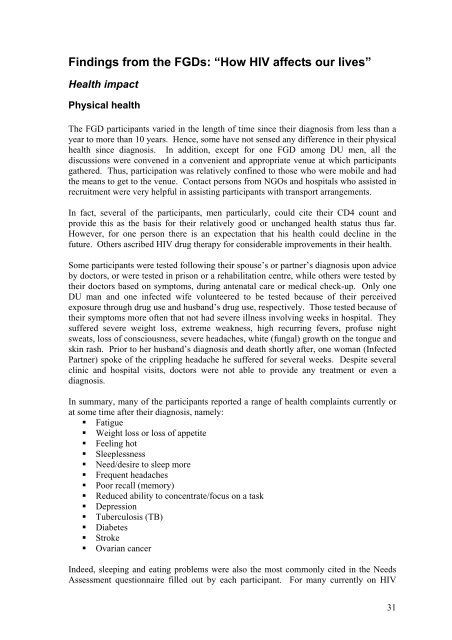Download this publication - AIDS Data Hub
Download this publication - AIDS Data Hub
Download this publication - AIDS Data Hub
Create successful ePaper yourself
Turn your PDF publications into a flip-book with our unique Google optimized e-Paper software.
Findings from the FGDs: “How HIV affects our lives”Health impactPhysical healthThe FGD participants varied in the length of time since their diagnosis from less than ayear to more than 10 years. Hence, some have not sensed any difference in their physicalhealth since diagnosis. In addition, except for one FGD among DU men, all thediscussions were convened in a convenient and appropriate venue at which participantsgathered. Thus, participation was relatively confined to those who were mobile and hadthe means to get to the venue. Contact persons from NGOs and hospitals who assisted inrecruitment were very helpful in assisting participants with transport arrangements.In fact, several of the participants, men particularly, could cite their CD4 count andprovide <strong>this</strong> as the basis for their relatively good or unchanged health status thus far.However, for one person there is an expectation that his health could decline in thefuture. Others ascribed HIV drug therapy for considerable improvements in their health.Some participants were tested following their spouse’s or partner’s diagnosis upon adviceby doctors, or were tested in prison or a rehabilitation centre, while others were tested bytheir doctors based on symptoms, during antenatal care or medical check-up. Only oneDU man and one infected wife volunteered to be tested because of their perceivedexposure through drug use and husband’s drug use, respectively. Those tested because oftheir symptoms more often that not had severe illness involving weeks in hospital. Theysuffered severe weight loss, extreme weakness, high recurring fevers, profuse nightsweats, loss of consciousness, severe headaches, white (fungal) growth on the tongue andskin rash. Prior to her husband’s diagnosis and death shortly after, one woman (InfectedPartner) spoke of the crippling headache he suffered for several weeks. Despite severalclinic and hospital visits, doctors were not able to provide any treatment or even adiagnosis.In summary, many of the participants reported a range of health complaints currently orat some time after their diagnosis, namely:• Fatigue• Weight loss or loss of appetite• Feeling hot• Sleeplessness• Need/desire to sleep more• Frequent headaches• Poor recall (memory)• Reduced ability to concentrate/focus on a task• Depression• Tuberculosis (TB)• Diabetes• Stroke• Ovarian cancerIndeed, sleeping and eating problems were also the most commonly cited in the NeedsAssessment questionnaire filled out by each participant. For many currently on HIV31















